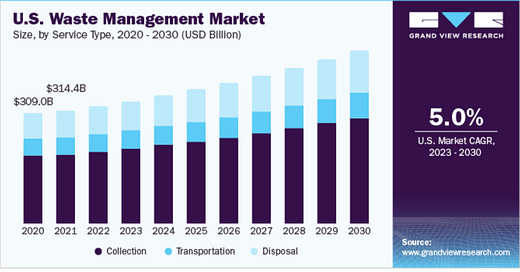Finding value in trash management 🗑️♻️
This week I moved to New York. A very New York staple, trash bags on sidewalks, got me thinking about the waste management industry — who is responsible for collecting trash? How are companies making money? How can it be disrupted?
So it turns out the global waste management industry is a ~$1.3 Trillion market, with the US representing 25% of that total market, and is expected to grow at a 5% CAGR between 2023 and 2030.
I find it interesting that over the last five years, all major waste management companies have grown significantly, both in terms of valuation and revenues. You can also see the growth reflected in their share prices, beating S&P and Dow Jones’ returns in the comparable five-year period.
So what’s precisely driving this growth? And can this growth continue? Post-COVID-19 safety standards and the global environmental and sustainability push are some of the major drivers behind this rally. Barring major international events, I expect the waste industry to transform with new technologies, pushing growth forward.
Impact of recyclable materials
While trash management’s majority of revenues are attributable to Landfill storage and management, recyclable materials are top of mind for waste management companies. With governments, corporations, and individuals emphasizing the use of recyclable materials, companies that develop advanced technologies to manage recycling efficiently should see healthy growth in their margins. Waste management companies also sell recyclable materials. So the demand for recyclable goods also dictates the topline. If a global recession strikes and organizations reduce their purchasing of recycled materials, revenues can get squeezed.
Renewable energy
Sustainability is so closely tied to the waste management industry that every organization working in the industry is trying to win goodie points from the government and shareholders by attaching itself to renewable energy. While generating power from landfill gas requires heavy capital expenditure upfront, it serves companies two purposes: a) companies use the landfill gas (methane) to generate energy which they can sell to the municipalities and individual customers 2) they get subsidies from governmental agencies to run their operations.
Robotics
Collecting trash and recyclables is a complex, thankless job, even though Drake and Future seemed happy to be waste management employees in the Life Is Good video. Companies can reduce operating costs by replacing humans with robots to pick up trash. Thanks to computer vision and machine learning, we can make this work. Lots of school and hackathon projects to solve this problem, but we need a large-scale investment (think of Cruise, Waymo level investment) to make this a reality given the upfront development costs and long return cycle.
Increasing recycling efficiency
You probably have heard that not everything you put in a recycle bin gets recycled. It is true. We need to develop advanced systems to detect whether an object can be recycled. Training models to see the contents of an item, and based on the product composition, systems need to decide whether an item can be recycled. Many great companies (AMP Robotics, Waste Robotics, etc.) are working in this field to improve the entire industry collectively.
Fleet electrification
With companies announcing big carbon-neutral and ESG goals, it only makes sense that waste management companies reduce their carbon footprint by deploying electric pickup trucks. Companies are pressured to invest in electric vehicles, which affects their bottom line. Those working on a favorable vehicle purchase strategy can meet the electric-vehicle goals without affecting their profits too much.
Parting observations
I believe the Fourth Industrial Revolution will have a transformative impact on the waste management industry. Deep Tech investors are realizing the value of combining the physical world with the digital, especially when integrating technology in age-old, traditional sectors. With the recent advancements in AI and ML, the technology-enabled waste management industry is not just an imagination but a reality. I guess vertically integrated robotics/ML/AI companies (think water pollutant detectors, carbon captures, etc.) will provide technological platforms to the big, publicly traded waste management companies and governments.






